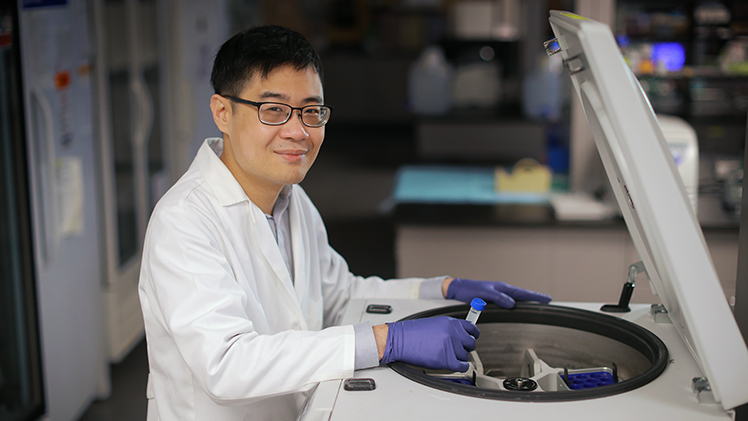A postdoctoral fellow in The University of Toledo College of Medicine and Life Sciences has been awarded a prestigious research grant from the American Liver Foundation to support his investigation of a potentially overlooked cause of liver cancer.
Dr. Beng San Yeoh was one of three scientists nationwide to receive the foundation’s Liver Scholar Award late last year.

Dr. Beng San Yeoh, a postdoctoral fellow in the UToledo College of Medicine and Life Sciences, is studying the role of bile acid and gut bacteria in liver cancer.
Yeoh joined the Department of Physiology and Pharmacology in 2020. Under the mentorship of Dr. Matam Vijay-Kumar, a professor in the Department of Physiology and Pharmacology, Yeoh has directed his research on the role of gut bacteria in liver disease, including hepatocellular carcinoma.
With his Liver Scholar Award — which is a three-year grant totaling $225,000 — he will more deeply investigate an earlier finding from UToledo that suggests a vascular deformity that diverts blood from the gut away from the liver and back into the body’s general blood supply may be a risk factor for liver cancer.
“This defect, called a portosystemic shunt, is frequently observed in people with liver disease. In our research, we found mice with this deformity had high levels of bile acid in their blood. All of those mice developed liver damage, and the mice that were fed a diet with ultra-processed food developed cancer,” Yeoh said. “Liver disease is particularly deadly. This deformity could be a major driver of the disease and potentially help clinicians diagnose the cancer early, when it’s most treatable.”
Portosystemic shunts can be thought of as a leak within the body’s normal vascular plumbing that allow blood to bypass the liver, resulting in abnormally high bile acid levels.
Bile acids are produced by the liver and aids in the digestion of fat in the food. Bacteria in the gut break some of those bile acids down into secondary bile acids, which are returned to the liver.
Yeoh’s project centers on the hypothesis that those changes, driven in part by diet, are responsible for liver injury and, in some cases, cancer.
“We’re trying to push the idea that bile acid can be used as a diagnostic biomarker of liver shunt. In the context of our mouse model, those that have an abnormality in bile acids are predetermined to get liver cancer later in life,” he said. “We can identify mice that are going to get liver cancer when they are very young, even before they’re weaned from their mothers. We hope to translate that idea to humans.”
Dr. Bina Joe, Distinguished University Professor and chair of the UToledo Department of Physiology and Pharmacology, said Yeoh is an exceptionally gifted researcher and has become a role model to other trainees.
“The depth of his scientific curiosity and persistence to create extraordinarily important new knowledge are admirable,” Joe said. “As someone who has watched his journey with this project, I knew that his dedication would be appreciated by his peers at-large. Beng’s liver award, which is a highly competitive national-level award, is one such top-tier endorsement.”
The Liver Scholar Award is usually presented to one researcher annually, though this year there were three recipients after the award went on hiatus in 2020, 2021 and 2022.
As a career development grant, the award supports early career scientists who are pursuing basic and translational research in liver biology and disease, bridging the gap between their research training and transition to an independent research scientist.
With the American Liver Foundation funding, Yeoh hopes to more specifically identify the mechanisms at play in the development of liver cancer in those with portosystemic shunts and how diet-induced changes in gut bacteria can accelerate and worsen liver disease.
“This grant and the resources it brings will allow me to develop myself more intellectually, more independently,” he said. “I’m grateful for the support of the American Liver Foundation and their recognition of the impact, relevance and potential of this work.”